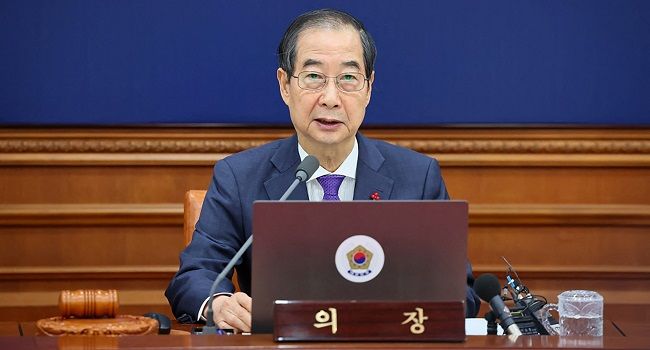South Korean Lawmakers Impeach Acting President Han Duck-soo, Deepening Political Crisis

South Korean lawmakers voted to impeach acting President Han Duck-soo on Friday, intensifying the country’s ongoing political crisis just two weeks after the suspension of his predecessor, President Yoon Suk Yeol, over a controversial martial law declaration. Han, who was serving as prime minister, assumed the presidency on December 14 after parliament voted to impeach Yoon on charges of insurrection.
Opposition lawmakers moved to strip Han of his duties, accusing him of refusing to continue Yoon’s impeachment process and bringing the suspended president to justice. National Assembly Speaker Woo Won-shik announced that the impeachment motion had passed, with all 192 lawmakers who voted supporting the motion. The vote marked South Korea’s first impeachment of an acting president.
Following the announcement, lawmakers from the ruling People’s Power Party (PPP) strongly protested. They argued that only a simple majority was needed for the impeachment to pass, as opposed to the two-thirds majority required to remove Yoon. PPP members chanted loudly in protest, with many rushing toward the speaker’s podium, demanding Woo’s resignation. They chose not to participate in the vote.
PPP leader Kweon Seong-dong expressed defiance after the vote, stating that Han “must continue to lead state affairs without yielding to the opposition’s passage of the impeachment motion.” However, Han later acknowledged the parliament’s decision, expressing respect for it, and said he would await the Constitutional Court’s decision on whether to uphold the impeachment.
In the aftermath, Finance Minister Choi Sang-mok was appointed to assume the roles of both acting president and prime minister. He pledged to work toward ending the political upheaval, emphasizing that minimizing governmental turmoil was a top priority.
“We will dedicate all our efforts to overcoming this period of turmoil,” Choi said in a statement following his appointment.
As the political crisis deepens, South Korea’s economy also faced significant strain. The won fell to a 16-year low against the US dollar on Friday, continuing the downward trend seen after Yoon’s martial law declaration. Seoul’s stock market also saw a sharp decline, with the KOSPI Index dropping by 1.02%.
At the core of the impeachment movement against Han was his refusal to appoint additional judges to the Constitutional Court, which will decide whether to uphold the impeachments of both Yoon and Han. The court is currently short of three judges, and while it can proceed with its six remaining members, a dissenting vote could reinstate Yoon. The opposition had called for Han to approve three more nominees to fill the nine-member bench, but Han resisted, arguing for a consensus between the ruling and opposition parties.
“The refusal to appoint the judges revealed his true colours,” said Democratic Party lawmaker Jo Seoung-lae, accusing Han of deliberately avoiding a special investigation into those involved in the insurrection. Jo further stated that Han’s actions violated his duty to uphold the law and serve the public.
In response, Han defended his position, stating that the appointment of judges should be based on a national consensus, not unilateral decisions. “A consensus between the ruling and opposition parties in the National Assembly, representing the people, must first be reached,” Han said.
Meanwhile, the Constitutional Court held its first preliminary hearing on the validity of Yoon’s impeachment, despite the ongoing political drama. The suspended president’s legal team was present during the hearing. Additionally, police began raiding a presidential safe house as part of the ongoing investigation into the martial law declaration, collecting footage from nearby security cameras.





